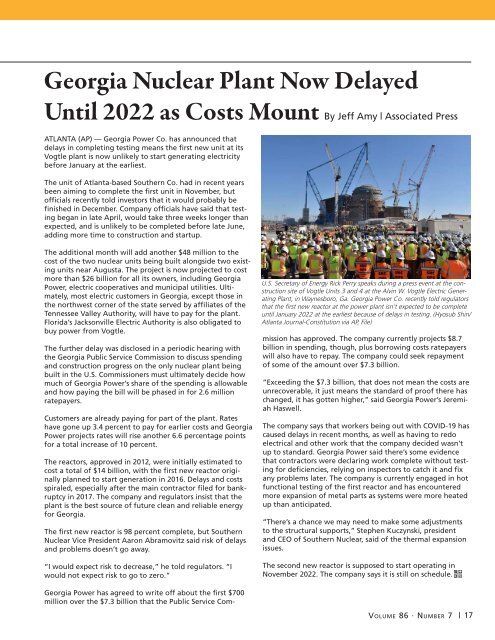CEAC-2021-07-July
You also want an ePaper? Increase the reach of your titles
YUMPU automatically turns print PDFs into web optimized ePapers that Google loves.
Georgia Nuclear Plant Now Delayed<br />
Until 2022 as Costs Mount By Jeff Amy | Associated Press<br />
ATLANTA (AP) — Georgia Power Co. has announced that<br />
delays in completing testing means the first new unit at its<br />
Vogtle plant is now unlikely to start generating electricity<br />
before January at the earliest.<br />
The unit of Atlanta-based Southern Co. had in recent years<br />
been aiming to complete the first unit in November, but<br />
officials recently told investors that it would probably be<br />
finished in December. Company officials have said that testing<br />
began in late April, would take three weeks longer than<br />
expected, and is unlikely to be completed before late June,<br />
adding more time to construction and startup.<br />
The additional month will add another $48 million to the<br />
cost of the two nuclear units being built alongside two existing<br />
units near Augusta. The project is now projected to cost<br />
more than $26 billion for all its owners, including Georgia<br />
Power, electric cooperatives and municipal utilities. Ultimately,<br />
most electric customers in Georgia, except those in<br />
the northwest corner of the state served by affiliates of the<br />
Tennessee Valley Authority, will have to pay for the plant.<br />
Florida’s Jacksonville Electric Authority is also obligated to<br />
buy power from Vogtle.<br />
The further delay was disclosed in a periodic hearing with<br />
the Georgia Public Service Commission to discuss spending<br />
and construction progress on the only nuclear plant being<br />
built in the U.S. Commissioners must ultimately decide how<br />
much of Georgia Power’s share of the spending is allowable<br />
and how paying the bill will be phased in for 2.6 million<br />
ratepayers.<br />
Customers are already paying for part of the plant. Rates<br />
have gone up 3.4 percent to pay for earlier costs and Georgia<br />
Power projects rates will rise another 6.6 percentage points<br />
for a total increase of 10 percent.<br />
The reactors, approved in 2012, were initially estimated to<br />
cost a total of $14 billion, with the first new reactor originally<br />
planned to start generation in 2016. Delays and costs<br />
spiraled, especially after the main contractor filed for bankruptcy<br />
in 2017. The company and regulators insist that the<br />
plant is the best source of future clean and reliable energy<br />
for Georgia.<br />
The first new reactor is 98 percent complete, but Southern<br />
Nuclear Vice President Aaron Abramovitz said risk of delays<br />
and problems doesn’t go away.<br />
“I would expect risk to decrease,” he told regulators. “I<br />
would not expect risk to go to zero.”<br />
U.S. Secretary of Energy Rick Perry speaks during a press event at the construction<br />
site of Vogtle Units 3 and 4 at the Alvin W. Vogtle Electric Generating<br />
Plant, in Waynesboro, Ga. Georgia Power Co. recently told regulators<br />
that the first new reactor at the power plant isn’t expected to be complete<br />
until January 2022 at the earliest because of delays in testing. (Hyosub Shin/<br />
Atlanta Journal-Constitution via AP, File)<br />
Georgia Power has agreed to write off about the first $700<br />
million over the $7.3 billion that the Public Service Commission<br />
has approved. The company currently projects $8.7<br />
billion in spending, though, plus borrowing costs ratepayers<br />
will also have to repay. The company could seek repayment<br />
of some of the amount over $7.3 billion.<br />
“Exceeding the $7.3 billion, that does not mean the costs are<br />
unrecoverable, it just means the standard of proof there has<br />
changed, it has gotten higher,” said Georgia Power’s Jeremiah<br />
Haswell.<br />
The company says that workers being out with COVID-19 has<br />
caused delays in recent months, as well as having to redo<br />
electrical and other work that the company decided wasn’t<br />
up to standard. Georgia Power said there’s some evidence<br />
that contractors were declaring work complete without testing<br />
for deficiencies, relying on inspectors to catch it and fix<br />
any problems later. The company is currently engaged in hot<br />
functional testing of the first reactor and has encountered<br />
more expansion of metal parts as systems were more heated<br />
up than anticipated.<br />
“There’s a chance we may need to make some adjustments<br />
to the structural supports,” Stephen Kuczynski, president<br />
and CEO of Southern Nuclear, said of the thermal expansion<br />
issues.<br />
The second new reactor is supposed to start operating in<br />
November 2022. The company says it is still on schedule.<br />
Volume 86 · Number 7 | 17


















